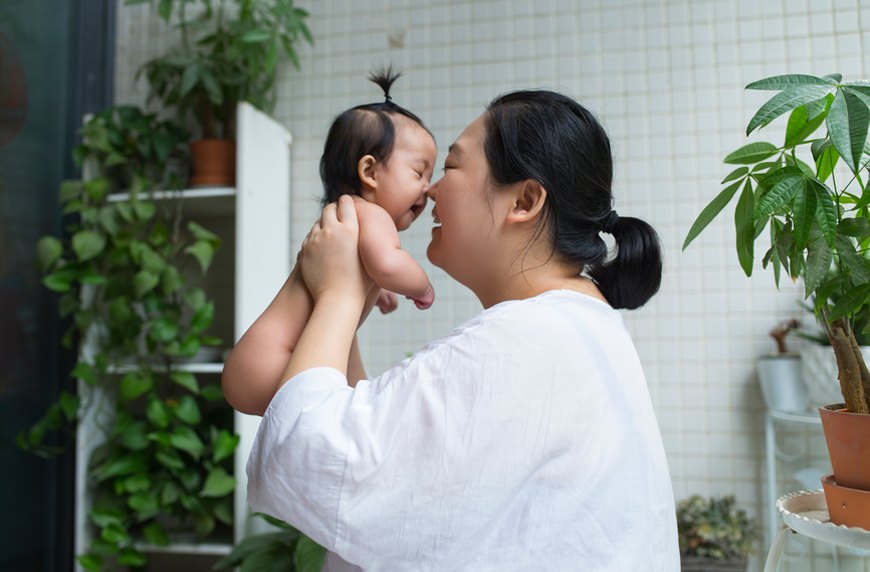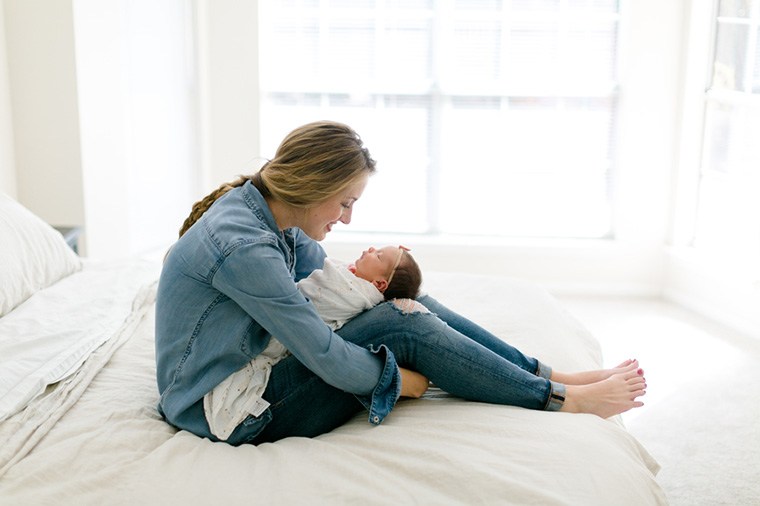This week on The Plus Factor, we’re talking about why the conversation around egg freezing is getting louder—and why more women are planning their families way before they're ready to settle down. If this rings a (baby) bell, writer Erin Bunch is right there with you. She did a deep-dive into what it *really* entails—and uncovered some surprises along the way.
If you’re of a certain age (read: over 30) and are not yet in the relationship, odds are good that more than one person has advised you to “just freeze your eggs.”
If this seems to be happening to you with increasing frequency (ugh), the culprit is likely more than the number of candles on your birthday cake: Using the procedure to extend your fertility (what’s known as “social egg freezing”) is gaining in popularity. According to data from the Society of Assisted Reproductive Technology, just 475 women froze their eggs in the US in 2009, compared to 6,207 in 2015. Particularly since 2012—when the American Society for Reproductive Medicine (ASRM) upgraded it out of "experimental" status, around the same time that the oldest millennials started entering their 30s—interest has been rising steadily. One fertility marketer, EggBanxx, even predicts that an eye-popping 70,000-plus women will freeze their eggs this year. Overheated sales pitch numbers, or an accurate estimate? Time will tell.
What deserves more scrutiny about that common refrain (“Why don’t you just freeze your eggs?”) is the “just” of it all.
But there's no doubt that the ASRM change has fueled the procedure’s popularity. Millennial-focused boutique freezing facilities—like Prelude Fertility and Ova, where former The Bachelor winner Whitney Bischoff is employed as a fertility nurse—are working to rebrand the process as less “scary sci-fi” and more “girl-power technology.” Bischoff and a few of her Bachelor cohorts (like Andi Dorfman) have done quite a bit of positive PR for the procedure, too, which has helped usher it into the limelight.
Meanwhile, an increase in marketing for “affordable” egg-freezing procedures for those who don’t have over $10,000 at their disposal (AKA me!) and highly publicized cost coverage by employers such as Google, Facebook, and even the US military seems to be making the procedure more widely available to women across income brackets.
Without a doubt, this big chill is on the rise. But what deserves more scrutiny about that common refrain (“Why don’t you just freeze your eggs?”) is the “just” of it all. Egg freezing—and the decision to do it or not to do it—is a big deal, and one that shouldn't be rushed by well-meaning people in your life advising you to just get 'er done.

{{post.sponsorText}}
The reason for this—as I discovered while interviewing several fertility experts both for this story and for my own personal peace of mind—is that each woman's details vary so greatly in terms of her biology, circumstance, plans, and even dreams that doctors tell me they'll advise different scenarios for every single woman who walks through their doors.
With that in mind, I took a deep dive into all things egg-freezing in order to see just how realistic this new promise of accessibility is.

How does it work?
First thing’s first: What do you have to go through in order to get your eggs out of your ovaries and into their little cryotherapy tanks?
Quite a bit, as it turns out.
It all starts with a fertility evaluation, with your doctor using blood tests and an ultrasound to measure the quantity of your egg stores, AKA your ovarian reserve. (For those in the early stages of considering the procedure—or, if you’re simply curious about your egg supply—you can also use an at-home test.) Then, your doctor will go over your results with you as well as ask questions about your current circumstances and future goals in order to help you reach an informed decision as to whether you want to move forward with the procedure. (More on that in a bit.)
If you opt to freeze, you will then be placed on hormonal birth control for one to two weeks in order to temporarily suppress your natural hormones. Next come the shots: You’ll begin daily, self-administered injections into your belly for nine to 12 days. While these these are commonly referred to as “hormone injections,” Shahin Ghadir, MD, a fertility specialist at the Southern California Reproductive Center (SCRC), says what they actually do is stimulate the pituitary gland, which sends signals to your ovaries so that they will produce their own hormones.
In this injection phase, you’ll be at the doctor's office a lot: anywhere from four to seven times (over one to two weeks) in order to evaluate your body’s response to the medications. Protocol (e.g. dosages and timetables) may be adjusted according to what’s found in these sessions.
Only a percentage of your eggs will survive the thaw, only a percentage of those will fertilize, and only a percentage of those (maybe, if you’re lucky) can be implanted.
Once your eggs have matured, retrieval will occur. For this, you’ll be placed under mild sedation for around 10 minutes while your eggs are removed. “The eggs are extracted with a special ultrasound that goes in vaginally and has a needle at the tip that goes right through the vaginal wall to suck the eggs out of the ovaries,” Dr. Ghadir explains. He then tells me that most patients will recover after about an hour spent resting in-office and return to work the next day; however, he adds that those who produce more eggs may have a longer period of cramping after the procedure has concluded. (Among women I know who’ve undergone the procedure, experiences vary greatly.)
Generally, fertility experts recommend that you freeze as many eggs as possible (we’re talking double digits) because each egg ups your odds at a successful pregnancy down the line: Only a percentage of your eggs will survive the thaw, only a percentage of those will fertilize, and only a percentage of those will (maybe, if you’re lucky) get to the blastocyst phase, at which point they can be implanted in your uterus. This means that if you retrieve fewer eggs than you’d like in your first cycle, you may opt to go through the entire process again (and again, and again).
Once your doctor retrieves your eggs, you’ll be finished with the process. Your eggs, however will not. They’ll be transferred to a laboratory and flash-frozen via a process called vitrification. Then, they’ll be placed into storage until you come back for them.

How much does egg freezing cost?
Prices vary somewhat by facility, but as a frame of reference, Columbia Fertility says they charge $6,300 for the procedure. Medications (to stimulate egg production, prevent premature release of the eggs prior to the retrieval process, and help the eggs mature as fully as possible), will then cost anywhere from $3,000 to $7,000, depending on the protocol (remember, some women may need more medications than others depending on their body's response). So that's roughly $10,000-$15,000—then, storage costs around $1,200 per year. Yep, you may need to cut back on expenses in order to give your eggs a luxurious place to, er, chill.
As is to be expected, however, there are some disruptors emerging in the market. New York City-based Extend Fertility, for example, is able to offer lowered rates because they specialize solely in egg freezing. "At Extend Fertility, the first cycle costs $4,750 and any subsequent cycle costs $4,000," says Joshua U. Klein, MD, chief medical officer and reproductive endocrinologist at Extend Fertility. This quoted cost does not, however, include the price of medications; still, all in, retrieval at Extend can be as low as half the average price of retrieval at traditional facilities.
Some clinics offer payments as low as $200 per month (for five years)—kind of like an high-interest mortgage on your future motherhood.
These rare exceptions aside, however, if a clinic is billing itself as affordable, it's likely because they've partnered with a financial institution to offer fertility-specific loans to patients who qualify. Some, like Extend and the Southern California Reproductive Center (SCRC), offer payments as low as $200 per month (for five years)—kind of like a high-interest mortgage on your future motherhood.
So read the fine print: Lisa Grossman Becht, MD, FACOG, an assistant professor in the department of obstetrics and gynecology at Columbia University Medical Center, notes that this route can actually be more expensive due to the interest accruing when you're paying very little per month.
It's important to note that in order for a frozen egg to become a baby, a second procedure called in-vitro fertilization (IVF) is required—so the egg freeze is just step one in a larger (and more costly) series of procedures, which aren't that far in the future. Dr. Ghadir tells me that the oldest woman he's ever gotten pregnant via her own frozen egg was 47, and that she is an outlier. "After the age of 44, chances of pregnancy [via IVF] are 1 percent," he says.
One final note of warning on price: If what’s quoted to you is significantly lower than the prices listed above, says Dr. Ghadir, you probably don't want to take a chance on the facility. "I don’t think you want to have eye surgery or do fertility treatments in the cheapest clinic you can find," he jokes. (But, really!)

What are the risks associated with freezing your eggs?
First of all, a common concern expressed by patients—that the egg freezing process somehow reduces your chances of conceiving naturally—is a total myth. “Freezing eggs does not impact future fertility, as it essentially just freezes the eggs from the ovary currently, which typically would degenerate at the end of the month,” says Dr. Grossman Becht. “Therefore, it does not decrease egg number, quicken time to menopause, or make it harder to get pregnant in the future.” Phew.
Dr. Klein adds, “While the lab technology of egg freezing is new, the clinical processes used in egg freezing—like the use of ovarian-stimulation medications and egg retrieval—have actually been in use for decades, and completed safely by millions of women.”
That being said, no medical procedure is completely without risk. According to Dr. Grossman Becht, “These include extremely rare chances of reaction to anesthesia, severe bleeding, or infection after the procedure.” She also adds that a small subset of women with a strong personal or family history of breast or ovarian cancer might be at risk for accelerated growth if abnormal cells are already present.
When I ask if there are any risks for the babies born of this process, Alan Penzias, MD, the chair of ASRM’s Practice Committee, tells me that there isn’t much data yet; however, he says that leading indicators don’t suggest any difference between babies born the old-fashioned way and those which originated from a frozen egg.

Is there an ideal age to undergo egg freezing?
To put it simply: The earlier the better. “Amazingly, if a woman uses eggs frozen from her younger self, her chances of getting pregnant are very similar to the chance she’d have had at the time they were frozen many years earlier,” Dr. Klein says.
Beyond this general rule of thumb, Dr. Grossman Becht tells me it’s difficult to define an “optimal” age for the procedure because it really depends on a woman’s overall fertility plan, ovarian reserve testing, medical history, and readiness to do an egg freeze cycle. “Ideally, the earlier one freezes eggs, the more and better quality eggs she will get from the process,” she says, and it’s worth noting that according to Extend Fertility, the number of chromosomally-abnormal eggs skyrockets from 35 percent at age 35 to 80 percent at 41. “Yet, the earlier one freezes, often the less likely she may be to use [her frozen eggs].”
By way of advice, Dr. Grossman Becht offers that ovarian reserve testing in your early-to-mid thirties is a great place to start. If your numbers are on the lower end, she says, it might be worthwhile to freeze ASAP. If they look more reassuring, you may instead want to hold off and reconsider again at 35; however, you don’t want to delay too long beyond that if you’re hoping for children. “After age 40, success rates greatly decline,” she says. “Some studies have looked at a cost-benefit ratio and noted one should freeze her eggs by age 37 to 38.”
If you’re in your early twenties, have the cash, and want to give yourself the best opportunity for choice later on in life, you may be wondering if there are any drawbacks to putting your eggs on ice early. “Hypothetically, there shouldn’t be any degradation over time,” says Dr. Penzias. That said, there’s not enough research yet to make this claim conclusively.

What’s next?
Social egg freezing has already seen big changes in the six years its been available: The procedure has become more socially understood and accepted, more accessible via loan partnerships and other cost-reducing innovations, and more effective: “A newer type of freezing called vitrification has become standard of care over the last nine years and with that method we see much higher egg thaw rates (greater than 90 percent as compared to 60 percent)," says Dr. Grossman Becht. "Additionally with much higher numbers of both egg freeze and thaw cycles, centers are increasing their experience and perfecting their techniques, which is also leading to higher success rates.”
Dr. Ghadir doesn't predict any monumental advances in the technology in the near term, but word of mouth is helping a topic that was niche and shadowy go mainstream. And as demand subsequently increases, innovations will almost certainly follow.
Cost coverage is likely the arena which stands to see the biggest changes in the near term, with innovative new approaches like Carrot Fertility, founded in 2016, which works with businesses to build custom fertility care plans. Much of their new business, says Carrot's CEO and co-founder Tammy Sun, comes from individuals who ask Carrot to connect with their employer. In other words, this is becoming an important issue for employees, and employers may soon find themselves in a position of having to offer fertility benefits in order to stay competitive. (Praying hands emoji.)
Still, egg-freezing benefits have been condemned (it's a "bogus bribe," as one Guardian columnist put it) for being as a Band-Aid: Instead of incentivizing women to delay their pregnancies, companies should first focus on supporting working mothers, critics say. And delaying childbearing is still a gamble that might not work out, no matter how much you spend.
With this in mind, I ask Dr. Penzias if he thinks women should ultimately be advised to prioritize natural conception in their years of optimal fertility despite the availability of this technology. "I would rephrase that," he says. "It’s best to become educated about your own biology and understand it so you can process the information through the filter that is your life and decide how you wish to prioritize things."
If you're thinking about conceiving the old-fashioned way, here are the 3 most important lifestyle changes to make before you get pregnant. And here's how to navigate a job search with baby on board.
Loading More Posts...